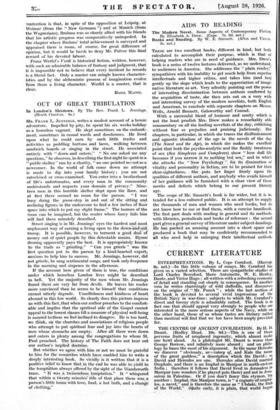OUT OF GREAT TRIBULATION
In London's Shadows. By The Rev. Frank L. Jennings._ (Heath Cranton. 6s.) Ma. FRANK L. JENNINGS, writes a modest account of a heroic adventure. Impelled by pity, he spent his six weeks holiday. as a homeless vagrant. He slept sometimes on the embank-: ment, sometimes in casual wards and dosshouses. . He lived upon what he could earn by such little trades and . activities as peddling buttons and laces, walking between., sandwich boards or singing in the street. He associated, entirely with " down and outers." No one asked me any questions," he observes, in describing the first night he spent in a " public shelter run by a charity, " no one pointed me out as a newcomer. In the world of folk come down no attempt, is made to dip into your family history ; you are not catechized or cross-examined. You enter into a brotherhood of life's unfortunates, and every man in the community understands and respects your domain of privacy." Nine-, teen men in this horrible shelter slept upon the floor, and at first there seemed no room for the parson. " I was busy doing the goose-step in and out of the sitting and reclining figures in the endeavour to find a few inches of floor space into which to put my slight frame." The horrors of the room can be imagined, but the reader whose fancy fails him Will find them minutely described.
Street singing is in Mr. Jennings' eyes the hardest and most unpleasant way of earning a living open to the down:and-nut tramp. It is possible, however, to torment a good deal 'Of money out of quiet people by this detestable means. Hymn' droning apparently pays the best. It is appropriately known' to the trade as " grizzling." " Can you grizzle " was the first question put to the parson by a kind-hearted expert; anxious to help him to success. Mr. Jennings, however, did not grizzle, he sang sentimental songs, and took only fivepence In the morning and sixpence in the afternoon.
If the account here given of them is true, the conditions under which homeless London lives might be described as hell. Yet the majority of the men whom Mr. Jennings found there are very far from devili. He leaves his reader more convinced than he seems to be himself that conditions cannot utterly degrade. Unselfishness and kindness of heart abound in this low world. So clearly does this picture impress us with this fact, that when our author preaches to the comfort- able and implies that the spiritual side of the Gospel cannot appeal to the lowest classes till a measure of physical well-being is assured to them we feel inclined to disagree. He is too hard, we think, on the churches and associations of religious people who attempt to put spiritual fear and joy into the hearts of men whose stomachs are empty. After all there were down and outers in plenty among the congregations to whom St. Paul preached. The history of The Faith does not bear out our author's implied Acietrine.
But whether we agree with him or not we must be grateful to him for ,the researches which have enabled him to write a deeply interesting book. So vividly is it written that it is a positive relief to.know that in the end he was able to yield to the temptation always offered by the sight of the Wandsworth tram. " It was a. treiriendous temptation." It " whispered that within a t(venty minutes' ride of that place there was a parson's little home with love, food, a hot bath, and a change of clothing."






































 Previous page
Previous page